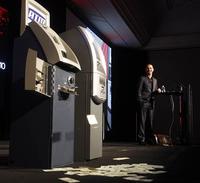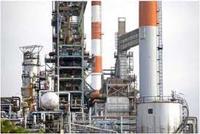-
Black Hat event highlights vulnerability of U.S. critical infrastructure

Cybersecurity researchers at the Black Hat conference now going on in Las Vegas, will demonstrate how hackers can gain access to U.S. critical infrastructure, and even cause explosions in oil and gas facilities, by altering the readings on wireless sensors used by the oil and gas industry. The faulty sensors typically cost between $1,000 and $2,000 each, and hundreds or even thousands of them are used at a single oil, gas, or water facility.
-
-
NIST seeking comments on energy industry security scenarios
The National Cybersecurity Center of Excellence (NCCoE) works with industry, academic, and government experts to create open, standards-based, modular, end-to-end solutions to cybersecurity challenges that are broadly applicable across a sector. The solutions are customizable to the needs of individual businesses, and help them more easily comply with relevant standards and regulations. The work is organized around use cases that describe sector-specific challenges.
-
-
Nuclear academics, professionals meet for 6th annual ATR NSUF Users Week
The sixth annual Advanced Test Reactor National Scientific User Facility (ATR NSUF) Users Week was held 10-14 June at University Place, the satellite campus for Idaho State University and University of Idaho in Idaho Falls. This nuclear research-themed week was the user facility’s opportunity to update the user community on nuclear energy issues and tools, conduct a research forum where users can come and present their research, run specialized workshops, and build collaboration among academic, industry and government institutions.
-
-
Analysts: arrogance, clumsiness of oil and gas industry caused fracking’s bad image
Oil and gas industry experts say arrogance, secrecy, and poor communication by the drilling industry have led to public anger over hydraulic fracturing, or fracking. These experts are calling for fracking companies to release more information to alleviate public concerns about the relationship between the drilling technology and water contamination.
-
-
Well water contaminants highest near natural gas drilling: study
A new study of 100 private water wells in and near the Barnett Shale showed elevated levels of potential contaminants such as arsenic and selenium closest to natural gas extraction sites. Researchers believe the increased presence of metals could be due to a variety of factors including: industrial accidents such as faulty gas well casings; mechanical vibrations from natural gas drilling activity disturbing particles in neglected water well equipment; or the lowering of water tables through drought or the removal of water used for the hydraulic fracturing process. Any of these scenarios could release dangerous compounds into shallow groundwater.
-
-
Senate panel to vote this week on cybersecurity bill
The Senate Commerce Committee will this week vote on an industry-backed cybersecurity bill before Congress takes an August recess. Last year the Senate twice tried, and failed, to pass a cybersecurity bill because of GOP opposition to it. GOP lawmakers objected to a bill imposing mandatory cybersecurity standards on industry, and instead called for a bill which would make the adoption of cybersecurity standards voluntary. The bill now being considered in the Commerce Committee calls for industry and NIST to develop a cybersecurity framework for industry (something NIST is already doing following a presidential executive order), and for industry voluntarily to adopt it.
-
-
The hidden dangers of south-of-the-border hot sauce

In the last decade, the U.S Food and Drug Administration (FDA) issued several warnings about and recalls of imported food products that exceed federal standards for lead. Products containing chili peppers and salt, such as Mexican-style candies, were often suspected as sources of lead contamination. Researchers now find elevated lead levels in some hot sauces imported from Mexico. The researchers urge USDA and the FDA to develop enforceable screening standards for hot sauce.
-
-
La. flood protection agency sues 97 energy companies for wetland destruction
A Louisiana state agency on Wednesday filed a lawsuit against ninety-seven energy companies, charging that the companies have inflicted severe damage on fragile coastal wetlands, damage which left New Orleans and other Louisiana cities more vulnerable to hurricanes and storm surges. The agency wants the court to order these companies to pay steep penalties which would help the state restore the wetlands and thus recreate the natural buffer which had protected New Orleans.
-
-
Natural disasters caused $85 billion global economic loss during first half of 2013
Data show that economic losses from global natural disasters during the six month period ending 30 June totaled $85 billion (2012: 75 billion) — around 15 percent lower than the 10-year (2003-2012) average of $100 billion. Insured losses for the period reached $20 billion (2012: $25 billion) — approximately 20 percent below the 10-year average of $25 billion. Roughly 50 percent of the insured losses resulting from natural disaster events were recorded in the United States.
-
-
Lawmakers, citing shortcomings, threaten funding for chemical plant safety program

Heads of three congressional panels urge DHS secretary Janet Napolitano to take to correct shortcomings in the Chemical Facilities Anti-Terrorism Standards (CFATS) program. “As the authorizers and appropriators of this program, we write to you to express serious reservations about continuing to extend CFATS funding without evidence of substantial programmatic improvement,” the three chairmen write in their letter to Napolitano. The lawmakers pointed to flaws in the program’s risk evaluation system, compliance hurdles, implementation delays, and the failure of the program to identify vulnerable facilities.
-
-
Motivating businesses to adopt building resiliency standards
Increased resilience for buildings in the face of hurricanes, earthquakes, terrorism, or cyberattacks has been a major national security focus over the past decade. Such resilient buildings not only would be less susceptible to damage and work interruption but could become community gathering places in a general crisis. It will not be easy, however, to secure voluntary adoption of resiliency standards by industry and builders without adequate justification.
-
-
Harvesting carbon dioxide to produce electricity
Electric power-generating stations worldwide release about twelve billion tons of CO2 annually from combustion of coal, oil, and natural gas. Home and commercial heating produces another eleven billion tons. Researchers developed a technology which would make the CO2 react with water or other liquids and, with further processing, produce a flow of electrons that make up electric current.
-
-
Cost to U.S. of cybercrime lower than earlier estimates
The Center for Strategic and International Studies (CSIS) and security firm McAfee published a revision of McAfee’s previous estimate of the cost of cybercrime to the United States, reducing the amount from $1 trillion to $100 billion. Experts say this should not be a reason for complacency.
-
-
White House considering incentives for cybersecurity compliance
The Obama administration is considering whether to back tax breaks, insurance perks, and other legal benefits for companies which bolster their digital defenses. The incentives, which include limited protections from legal liability and tax incentives, would be set up to persuade power plants, water systems, chemical plants, and other critical infrastructure companies to comply with the voluntary cybersecurity rules which are being drafted as part of President Obama’s cybersecurity executive order.
-
-
UN warns regulators of mobile phone vulnerabilities
The United Nations is warning telecommunications regulators and government agencies about significant vulnerabilities in cell phone technology which would allow hackers to attack at least half a billion mobile phones worldwide.
-
- All
- Regional
- Water
- Biometrics
- Borders/Immig
- Business
- Cybersecurity
- Detection
- Disasters
- Government
- Infrastructure
- International
- Public health
- Public Safety
- Communication interoperabillity
- Emergency services
- Emergency medical services
- Fire
- First response
- IEDs
- Law Enforcement
- Law Enforcement Technology
- Military technology
- Nonlethal weapons
- Nuclear weapons
- Personal protection equipment
- Police
- Notification /alert systems
- Situational awareness
- Weapons systems
- Sci-Tech
- Sector Reports
- Surveillance
- Transportation
Advertising & Marketing: advertise@newswirepubs.com
Editorial: editor@newswirepubs.com
General: info@newswirepubs.com
2010-2011 © News Wire Publications, LLC News Wire Publications, LLC
220 Old Country Road | Suite 200 | Mineola | New York | 11501
Permissions and Policies
Editorial: editor@newswirepubs.com
General: info@newswirepubs.com
2010-2011 © News Wire Publications, LLC News Wire Publications, LLC
220 Old Country Road | Suite 200 | Mineola | New York | 11501
Permissions and Policies
